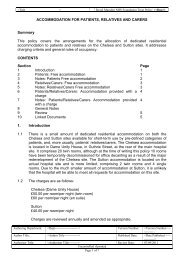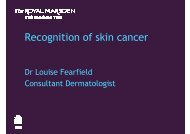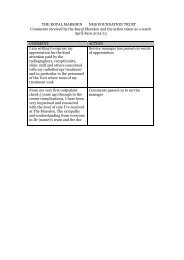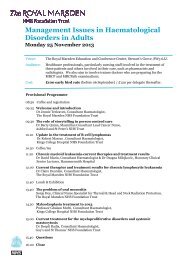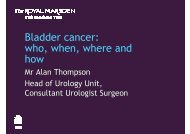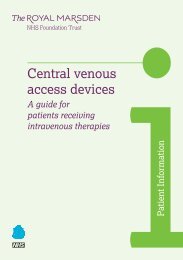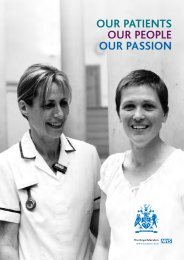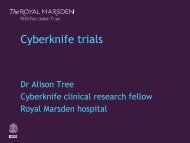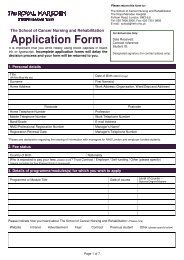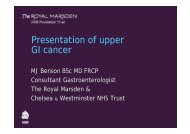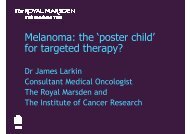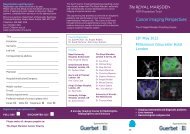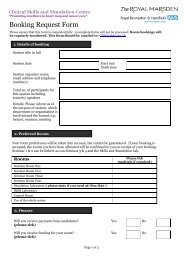Natalie Doyle - The Royal Marsden
Natalie Doyle - The Royal Marsden
Natalie Doyle - The Royal Marsden
You also want an ePaper? Increase the reach of your titles
YUMPU automatically turns print PDFs into web optimized ePapers that Google loves.
<strong>The</strong> <strong>Royal</strong> <strong>Marsden</strong>Survivorship; How do we as AHP’sand Nurse’s Promote LifestyleChanges in Our Population<strong>Natalie</strong> <strong>Doyle</strong>Nurse ConsultantLiving with and BeyondCancer
2<strong>The</strong> <strong>Royal</strong> <strong>Marsden</strong> Head and Neck Study Day 2013 21/01/13Survivorship…Macmillan Definition“A cancer survivor is someone who is livingwith cancer or who has had cancer”2010 1.6 million people2030 3 million people
3<strong>The</strong> <strong>Royal</strong> <strong>Marsden</strong> Head and Neck Study Day 2013 21/01/13Did you know?• 310,000 people in the UK are diagnosed withcancer every year– Office for National Statistics; Information Services Division (ISD) Scotland; Welsh CancerIntelligence & Surveillance Unit; Northern Ireland Cancer Registry. (2008)• <strong>The</strong>re are two million people living with orbeyond cancer in the UK– Maddams J, et al. 2009 British Journal of Cancer.. 101: 541-547.• <strong>The</strong> number of people living with cancer in theUK is increasing by 3.2% every year– Maddams J, et al. 2009. British Journal of Cancer. 101: 541-547.• One in eight of 65s and over in the UK have had acancer diagnosis– Maddams J, et al. 2009 Cancer prevalence in the United Kingdom: estimates for 2008. British Journal of Cancer..101: 541-547.
4<strong>The</strong> <strong>Royal</strong> <strong>Marsden</strong> Head and Neck Study Day 2013 21/01/13Survivorship… A Concept Analysis“Cancer survivorship is a process beginning atdiagnosis involving uncertainty. It is a lifechanging experience, with duality of positive andnegative aspects, unique to the individual butwith some universality”<strong>Doyle</strong> 2008
5<strong>The</strong> <strong>Royal</strong> <strong>Marsden</strong> Head and Neck Study Day 2013 21/01/13Survivorship…5 Attributes– A process beginning at diagnosis– Uncertainty– Life changing experience– Duality of positive and negative aspects– Individual experience with universality<strong>Doyle</strong>, 2008
6<strong>The</strong> <strong>Royal</strong> <strong>Marsden</strong> Head and Neck Study Day 2013 21/01/13Survivorship…<strong>The</strong> consequencesFunctionPhysicalPsychologicalSocialSpiritualDow et al, 1999RelationshipsBody imageIntimacyFertilitySexualitySocialOccupationalRoutinesSpiritualityQuality of Life
7<strong>The</strong> <strong>Royal</strong> <strong>Marsden</strong> Head and Neck Study Day 2013 21/01/13“<strong>The</strong> party, such as it was,was over”Carr 2004
8<strong>The</strong> <strong>Royal</strong> <strong>Marsden</strong> Head and Neck Study Day 2013 21/01/13National Cancer Survivorship Initiative– <strong>The</strong> vision of the NCSI is that by2012, those living with and beyondcancer are supported to live ashealthy and active a life as possiblefor as long as possible
9<strong>The</strong> <strong>Royal</strong> <strong>Marsden</strong> Head and Neck Study Day 2013 21/01/13Aims of National Cancer SurvivorshipInitiative– To understand the needs of those living with& beyond cancer– To develop models of care to meet theirneeds– To design evidence-based sustainableservices to accommodate increasing numbersof cancer survivors in the future– To create a community of interested peoplewho will continue to lead the agenda
11<strong>The</strong> <strong>Royal</strong> <strong>Marsden</strong> Head and Neck Study Day 2013 21/01/13Essential Principles– Risk Stratified pathways of care rather than one size fits all– Dynamic personal care plan following assessment of thedisease, the treatment, and the individual’s personalcircumstances– Information provision to meet individual needs, timely,promoting confidence, choice, and control– Individuals encouraged to self manage with support with rapidaccess to appropriate professional when problems arise
12<strong>The</strong> <strong>Royal</strong> <strong>Marsden</strong> Head and Neck Study Day 2013 21/01/13NCSI 2012: Five key elements1. Support through primary treatment from point ofdiagnosis2. Promoting recovery3. Sustaining recovery4. Reducing the burden of consequences oftreatment5. Supporting patients with active and advanceddisease – interfacing with end of life careservices
13<strong>The</strong> <strong>Royal</strong> <strong>Marsden</strong> Head and Neck Study Day 2013 21/01/13•Breast 80% patients•Colorectal 50% patients•Testicular 95% patients•Breast 10% patients•Colorectal 20% patients•Testicular patients 0%•Breast 10% patients•Colorectal 30% patients•Testicular patients 5%
14<strong>The</strong> <strong>Royal</strong> <strong>Marsden</strong> Head and Neck Study Day 2013 21/01/13
15<strong>The</strong> <strong>Royal</strong> <strong>Marsden</strong> Head and Neck Study Day 2013 21/01/13Self management support1 in 3 patients reported 5 moderate / severe unmet needs at endof treatment - for 60% not improved 6 months later, Armes et al2009Involves approaches which empower and activate people to feelconfident about managing their condition, and more likely tochange their behaviour.–‘activating’ people so that they can use information andsupport to manage their health and alter behaviours.–Re/skill/train clinicians to take a supportive ‘power sharing’rather than a ‘power holding’ approach.–Use service improvement expertise to make changes.
16<strong>The</strong> <strong>Royal</strong> <strong>Marsden</strong> Head and Neck Study Day 2013 21/01/13NCSI 2012: Key challenges for 2012-15– <strong>The</strong> culture shift: Engaging and influencingstakeholders. Refining the vision– Spread of “roll-out ready” elements– Further testing of “promising” proposals, withemphasis on costs and benefits (to influencecommissioners)– Costing of whole pathways– Development and implementation of metrics forsurvivorship– Development of IT for remote surveillance
17<strong>The</strong> <strong>Royal</strong> <strong>Marsden</strong> Head and Neck Study Day 2013 21/01/13Does this surprise you?“…the cancer experience does notend when treatment ends.”Rowland & Ganz, 2011, p.170
18<strong>The</strong> <strong>Royal</strong> <strong>Marsden</strong> Head and Neck Study Day 2013 21/01/13
19<strong>The</strong> <strong>Royal</strong> <strong>Marsden</strong> Head and Neck Study Day 2013 21/01/13So what can I do?– Holistic Needs Assessment– Treatment Summary– Cancer Care Review
20<strong>The</strong> <strong>Royal</strong> <strong>Marsden</strong> Head and Neck Study Day 2013 21/01/13Health and Wellbeing InitiativeMake a Change,Live Well
21<strong>The</strong> <strong>Royal</strong> <strong>Marsden</strong> Head and Neck Study Day 2013 21/01/13Make a Change, Live Well– Health Eating– Alcohol Consumption– Physical Activity– Smoking Cessation
22<strong>The</strong> <strong>Royal</strong> <strong>Marsden</strong> Head and Neck Study Day 2013 21/01/13Teachable MomentOpportunities exist to promote lifestylechanges that may improve the length andquality of life.Demark-Wahnefried et al, 2005
23<strong>The</strong> <strong>Royal</strong> <strong>Marsden</strong> Head and Neck Study Day 2013 21/01/13What is a Teachable Moment?“A developmental task is a task which is learned at aspecific point and which makes achievement ofsucceeding tasks possible.When the timing is right, the ability to learn aparticular task will be possible. This is referred to as a'teachable moment.'It is important to keep in mind that unless the time isright, learning will not occur. Hence, it is important torepeat important points whenever possible so thatwhen a student's teachable moment occurs, s/he canbenefit from the knowledge”– Havinghurst, Robert James, (1952). Human Development and Education, p. 7.
24<strong>The</strong> <strong>Royal</strong> <strong>Marsden</strong> Head and Neck Study Day 2013 21/01/13When is a Teachable Moment– A teachable moment is often bestdemonstrated with a significantemotional or traumatic event, theemphasis being on the 'moment'versus the lesson
25<strong>The</strong> <strong>Royal</strong> <strong>Marsden</strong> Head and Neck Study Day 2013 21/01/13Why is it a Teachable Moment?–A man who carries a cat bythe tail learns something hecan learn no other way.(Mark Twain)
26<strong>The</strong> <strong>Royal</strong> <strong>Marsden</strong> Head and Neck Study Day 2013 21/01/13What happens to people living with &beyond cancer?– “Cancer survivors are high healthcare utilizers whohave several distinct healthcare issues.”– “the evidence that cancer patients die of non cancercauses at a higher rate than persons in the generalpopulation is overwhelming.”– “Increased morbidity and decreased functional statusand disability that result from cancer, its treatment,or health-related sequelae also are significantconcerns.”
27<strong>The</strong> <strong>Royal</strong> <strong>Marsden</strong> Head and Neck Study Day 2013 21/01/13What could happen to people living with &beyond cancer?– Recurrent cancer– Second cancers– Obesity– Diabetes– Cardio-vascular disease– Osteoporosis– Decreased functional status– Something else?
28<strong>The</strong> <strong>Royal</strong> <strong>Marsden</strong> Head and Neck Study Day 2013 21/01/13However….– “A substantial number of reportssuggest that cancer survivorsspontaneously adopt lifestylechanges in hopes of achievingimproved health…”
29<strong>The</strong> <strong>Royal</strong> <strong>Marsden</strong> Head and Neck Study Day 2013 21/01/13And…“ ...some health behaviours, such as exercise areconsistently associated with positive effects onpsychological or emotional well-being (eg, moodstates,self-esteem and QOL) and reductions infatigue.”(McBride et al 2000)
30<strong>The</strong> <strong>Royal</strong> <strong>Marsden</strong> Head and Neck Study Day 2013 21/01/13Yet…“ Although a substantial proportion of cancersurvivors spontaneously initiate positivebehavioural changes, many do not. Males andthose who are less educated, over the age of65, or who live in urban areas are less likely toeither undertake healthful changes inbehaviour or maintain them.”
31<strong>The</strong> <strong>Royal</strong> <strong>Marsden</strong> Head and Neck Study Day 2013 21/01/13Surely they mean all of us?“ As cancer joins the ranks of chronic disease,oncologists will increasingly find themselves at ajuncture with their patients, as interests turn fromacute care to managing long-term health.”“…physicians are among the most powerful catalysts forpromoting behaviour change and therefore may beoptimally positioned to deliver guidance regardinghealth promotion….Current reports, however, suggestthat only approximately 20% of oncology carephysicians provide assistance in this area -…”
32<strong>The</strong> <strong>Royal</strong> <strong>Marsden</strong> Head and Neck Study Day 2013 21/01/13Reference– Riding the Crest of the Teachable Moment:Promoting Long-Term Health After theDiagnosis of Cancer– (2005)Demark-Wahnefried W, Aziz N.M., Rowland J.H., and Pinto B.M. Journal of Clinical Oncology 23 (24)
33<strong>The</strong> <strong>Royal</strong> <strong>Marsden</strong> Head and Neck Study Day 2013 21/01/13Is this true in your practice?– 52%-68% of cancer survivors are overweight/obese– Many cancer survivors do not meet dietaryrecommendations, e.g fruit & vegetables and dietaryfat consumption– Although the impact of consuming a healthydiet…after a cancer diagnosis is unclear, the othermedical & psychological benefits appear to make itadvantageous…the physical and emotional benefits– Rabin, C. (2012) Promoting Lifestyle Change Among Cancer Survivors: When Is <strong>The</strong>Teachable Moment? American Journal of Lifestyle Medicine 3(5) p. 369-378
34<strong>The</strong> <strong>Royal</strong> <strong>Marsden</strong> Head and Neck Study Day 2013 21/01/13As with many things…“It ain’t what you do it’s theway that you do it…andthat’s what gets results.”
35<strong>The</strong> <strong>Royal</strong> <strong>Marsden</strong> Head and Neck Study Day 2013 21/01/13Communication is the key–Solution focused care–Motivational interviewing
36<strong>The</strong> <strong>Royal</strong> <strong>Marsden</strong> Head and Neck Study Day 2013 21/01/13Self Efficacy <strong>The</strong>ory– A person’s sense of self-efficacy (mastery) isinfluenced by:– Achievements (positive performance feedback)– Physiological states (low stress)– Vicarious experience (see others achieving)– Verbal persuasion (Strengthening expectation)(in order of significance)Bandura 1977
37<strong>The</strong> <strong>Royal</strong> <strong>Marsden</strong> Head and Neck Study Day 2013 21/01/13– Self efficacy is a belief in one’sability to achieve something.Bandura 1977
38<strong>The</strong> <strong>Royal</strong> <strong>Marsden</strong> Head and Neck Study Day 2013 21/01/13With grateful thanks to…..Steve Hindle,Cancer Survivorship Programme Lead,Macmillan Cancer Support.
39<strong>The</strong> <strong>Royal</strong> <strong>Marsden</strong> Head and Neck Study Day 2013 21/01/13Contact<strong>Natalie</strong> <strong>Doyle</strong>Nurse Consultant, Living With& Beyond Cancernatalie.doyle@rmh.nhs.uk<strong>The</strong> <strong>Royal</strong> <strong>Marsden</strong> NHSFTFulham RoadLondonSW3 6JJTel 0207 352 8171 ext 1791



